ZEN MESTEREK ZEN MASTERS
« Zen főoldal
« vissza a Terebess Online nyitólapjára
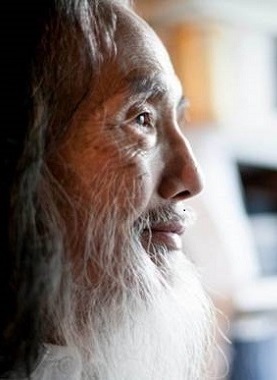
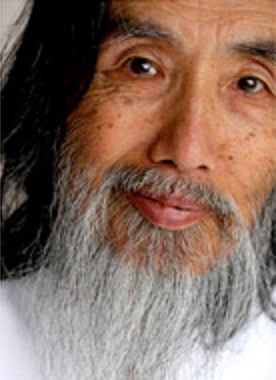
棚橋一晃 Tanahashi Kazuaki (1933-)
![]()
http://en.wikipedia.org/wiki/Kazuaki_Tanahashi
http://www.cuke.com/Cucumber%20Project/suzuki%20stories/kaz%20on%20suzuki.html
http://www.cuke.com/Cucumber%20Project/interviews/tanahashi.html
Publications
http://www.brushmind.net/publications/
PDF: The True Dharma Eye: Zen Master Dogen's Three Hundred Koans
with commentary and verse by John Daido Loori, translated by Kazuaki Tanahashi and John Daido Loori;
Boston: Shambhala Publications, 2005, 528 pages
PDF: Treasury of the True Dharma Eye: Zen Master Dogen's Shobo Genzo
Boston: Shambhala, 2010, in 2 vols., 2012, new edition in 1 vol.
Kazuaki Tanahashi and a team of translators that represent a Who's Who of American Zen have produced a translation of the great work that combines accuracy with a deep understanding of Dogen's voice and literary gifts. The finely produced, two-volume boxed set includes a wealth of materials to aid understanding, including maps, lineage charts, a bibliography, and an exhaustive glossary of names and terms—and, as a bonus, the most renowned of all Dogen's essays, “Recommending Zazen to All People.”
Zen Master Dogen Reader on Shikantaza
by Kazuaki Tanahashi
http://www.upaya.org/uploads/pdfs/shikantazanreadergen.pdf“POINT OF ZAZEN”
“A GENERAL RECOMMENDED WAY OF SITTING”
“BENDOWA”
“KING OF SAMADHIS”Tanahashi, Kazuaki (ed. 1985), Moon in a Dewdrop: Writings of Zen Master Dogen (New York: North Point Press).
Tanahashi, Kazuaki (ed. 2000), Enlightenment Unfolds: The Essential Teachings of Zen Master Dogen (Boston: Shambhala).
Tanahashi, Kazuaki (ed. 2004), Beyond Thinking: A Guide to Zen Meditation by Zen Master Dogen (Boston: Shambhala).
Partial Translation by Tanahashi Kazuaki et al.
From the 75-fascicle redaction
20. 有時 Uji Translated by Dan Welch & Kazuaki Tanahashi
29. Sansui kyô. Mountains and Waters Sutra Translated by Arnold Kotler & Kazuaki TanahashiOther fascicles
8. 生死 Shôji Translated by Arnold Kotler & Kazuaki Tanahashi
PDF: Sky Above, Great Wind: The Life and Poetry of Zen Master Ryokan
Boston and London: Shambhala Publications, 2012.
PDF: Heart Sutra: A Comprehensive Guide to the Classic of Mahayana Buddhism
Boston and London: Shambhala Publications, 2014.
PDF: Zen Chants: Thirty-Five Essential Texts with Commentary
Boston and London: Shambhala Publications, 2015.
DOC: The Complete Cold Mountain: Poems of the Legendary Hermit Hanshan,
Translated by Kazuaki Tanahashi and Peter Levitt. Text in Chinese and English.
Shambala, 2018, 280 p.
Extracts in DOC > PDF > PDF
PDF: Essential Zen
Edited by Kazuaki Tanahashi and Tensho David Schneider
San Francisco, 1994
PDF: The Essential Dogen: Writings of the Great Zen Master
by Kazuaki Tanahashi and Peter Levitt
Boston and London, 2013
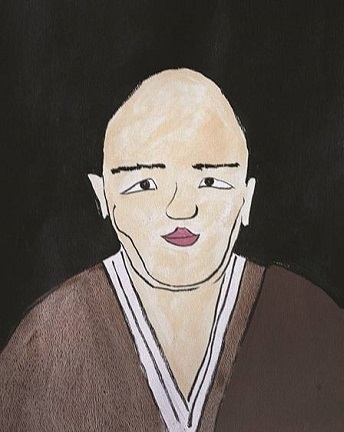
Dogen. Illustration by Kazuaki Tanahashi
Dogen: A Thirteenth-century Post-Existentialist
by Kazuaki Tanahashi
Dharma Eye, October 2001, No. 9.
"What makes Dogen different from all other thinkers?" someone asked when I gave a talk at St. John's College in Santa Fe.
"His deep trust in action," I replied. "Facing the enormity of the problems in the world, we often become cynical, doubting that individual actions can make a significant impact. Dogen's view of the power of each individual action can be a driving force in challenging this cynicism."
Forty years ago as a beginning artist in Japan, I was searching for a spiritual guide. One day I came across these lines in the "Zenki" (Undivided Activity) fascicle of Shobogenz o:
Birth is just like riding in a boat. You raise the sails, row with the oar, and steer. Although you row, the boat gives you a ride, and without the boat you couldn't ride. But you ride in the boat and your riding makes the boat what it is… When you ride in a boat, your body and mind and the environs together are the undivided activity of the boat. The entire earth and the entire sky are both the undivided activity of the boat. 1
I was blown away by this statement. What an amazing image! "Your riding makes the boat what it is." How positive Dogen's vision was!
At that time, I was under the influence of the Existentialists, in whose writings I heard a tone of helplessness, despair, and boredom. It seemed to me that Dogen had started out from the same point as the Existentialists: life is short and all things are impermanent. Yet he had penetrated the place where they were stuck, and arrived at the point of trust in action that transforms the inner and outer world.
Dogen believed in the simple act of zazen. His world view, paradoxical images, and complex language were intended to point to the function and merit of zazen authentically transmitted from the lineage of his predecessors. All activities in the monastery for him were extensions of zazen practice. He emphasized the importance of each action to maintain the community life--cooking, administration, or greeting one another. In his teaching discipline is no different from freedom and wisdom becomes inseparable from compassion. Some of his writings talk about extending the spirit beyond the monastic world. In "Bodaisatta Shishôhô" (Bodhisattva's Four Methods of Guidance) he says:
You should benefit friend and enemy equally. You should benefit self and others alike. If you have this mind, even beneficial action for the sake of grasses, trees, wind, and water is spontaneous and unremitting. 2
He did not try to change the laws or political system of Japan in his time. He was not an environmental activist, as there was no prominent environmental destruction. Yet I believe Dogen's writing can inspire those who want to take action in this time of environmental crisis. His unequivocal positivity encourages usto work for the future.
With members of San Francisco Zen Center, I have been translating Dogen's writings over two decades.Strangers often thank me for having helped their meditation practice with our translation. This makes our effort worthwhile. Dogen is still present and guides many of us right now.
To translate a particular piece I usually work with a partner who is an advanced Zen practitioner and excellent native writer of English. Exploring the meaning of the original lines and searching for the best possible corresponding expressions in English is a slow and painstaking yet extremely enjoyable process. In the past I referred constantly to major commentaries by Soto masters on the Shobogenzo. But now I feel we should ask Dogen about Dogen's words; the keys for decoding a certain passage may be found in other parts of his extensive writings. Trying to find a way to transmit his words into another language gives a new dimension to understanding Dogen. Translators in different parts of the world may be seen as members of an invisible community of expanding Dogen scholarship.
In "Gyoji" (Continuous Practice), Fascicle One, he says:
By the continuous practice of all buddhas and ancestors, your practice is actualized and your great road opens up. By your continuous practice, the continuous practice of all buddhas is actualized and the great road of all buddhas opens up. Your continuous practice creates the circle of the way. 3
Again, this confirms his vision of the inseparableness of individual action and a community through time. If past and present dynamically interact in this way, we need to honor the past and try to listen to this master from the past as attentively as possible. It is striking again and again that we learn so much whenever we investigate Dogen's words in order to translate them. We may have more up-to-date and wide-ranging knowledge. But we lack the deep understanding that we recognize in him. We remain his humble students.
Nowadays many people including those in the Western world regard him as one of the greatest thinkers of East Asia. But regarding Dogen as a thinker, writer, poet, or even a mystic or religious figure may not represent him fully. He was all these combined. And above all, he was a master of nonthinking.
Dogen cut through the boundary of dualistic thinking and elucidated the vastness of the meditative state of body and mind--thinking beyond thinking, consciousness beyond intellect. This is the state free from preconceptions and self-imposed limitations. This is where the self becomes beyond self, the small becomes not small, dreams become not merely dreams. Actions supported by the consciousness that is open to this non-dual awareness can be selfless, visionary, and vast in scale. Such actions are urgently needed today and I believe Dogen can be an indispensable resource in our pursuit of this process.
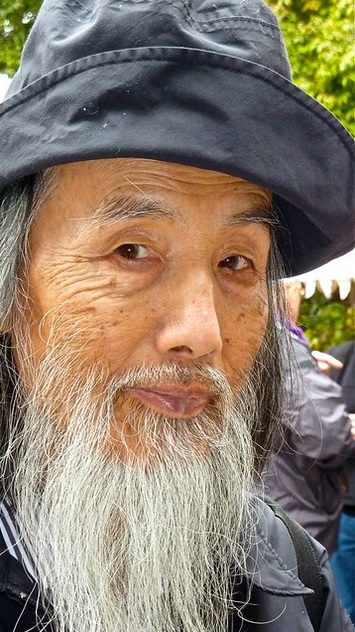
円相 Ensō / Zen Circles
by 棚橋一晃 Tanahashi Kazuaki
"In the Zen tradition ensos, or circle symbols,
have been drawn with black ink on paper, to represent enlightenment.
As the multi-colored flow of paint represents the interconnectedness
of all life, each circle reflects my hopes, visions and aspirations
for a world making a healthier choices
for the benefit of future generations."
— Kaz
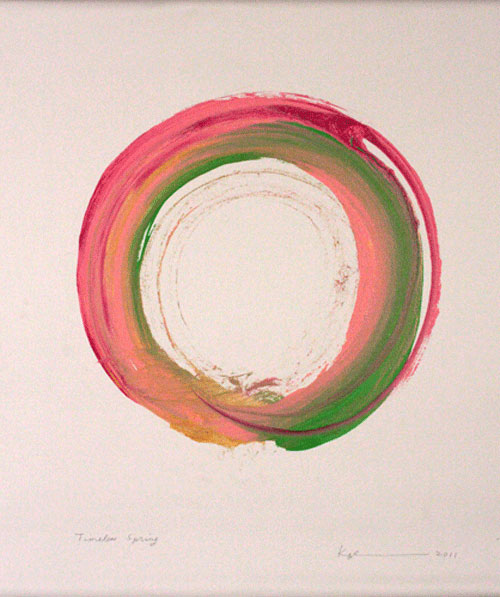
"The enso contains the perfect and imperfect; that is why it is always complete."
— Kazuaki Tanahashi
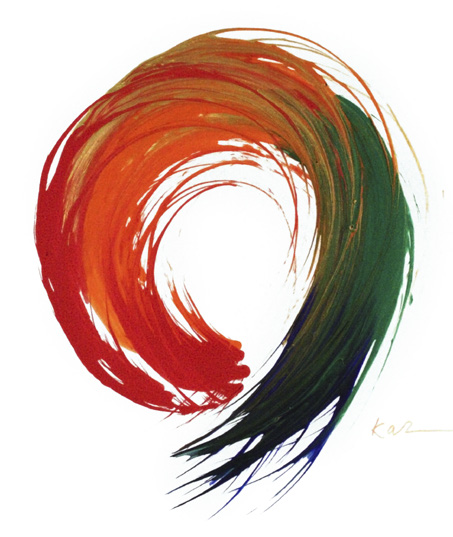
”If each moment is our entire life, how dare we kill time?
If each stroke is our entire breath, how dare we correct it?”
— Kazuaki Tanahashi
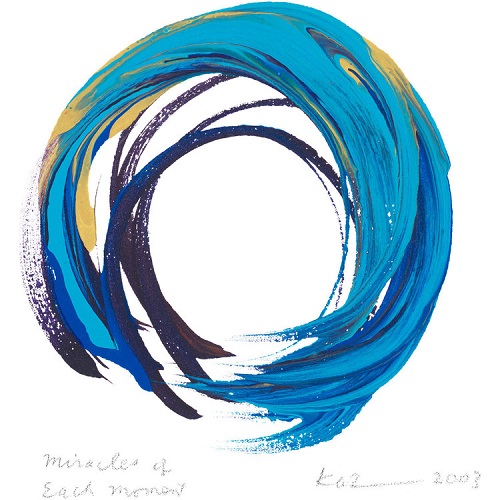
"Each moment is a miracle encompassing everything: the joy and sorrow, the failure and success, the disappointment and happiness, the celebration and grief."
— Kazuaki Tanahashi
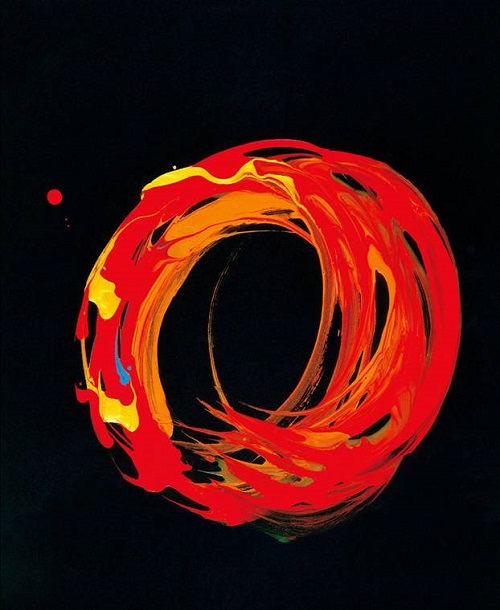
"If you learn to enjoy waiting, you don't have to wait to enjoy."
— Kazuaki Tanahashi
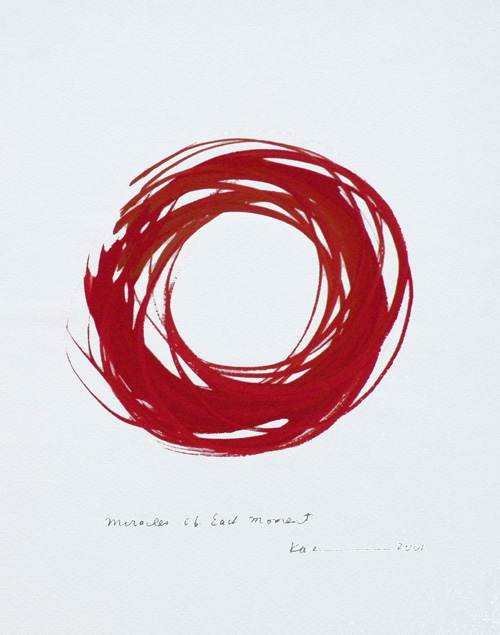
”It's impossible to make a perfect circle. We simply give up the idea of trying to be perfect. We surrender to the idea of creating something imperfect all the time.”
— Kazuaki Tanahashi
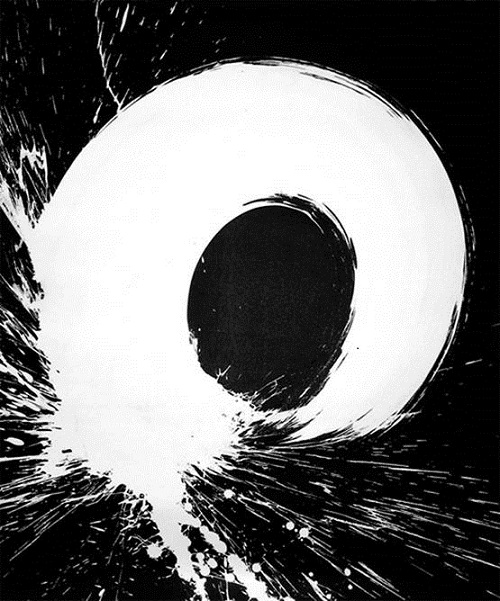
"Taking a break will allow a breakthrough to happen."
"To be thoroughly lazy is a tough job, but somebody has to do it. Industrious people build industry. Lazy people build civilization."
— Kazuaki Tanahashi